- Home
- Karen Traviss
The World Before Page 7
The World Before Read online
Page 7
“Where the fuck have you been?” said Eddie.
There was a five-second delay on the last leg of the relay, the router that joined the ITX to light-speed links near Earth. Mick’s gaze was aimed past him. “What’s that behind you?”
“That’s a live feed from Eqbas Vorhi. Look, I thought I’d been cut off for good. I haven’t had an incoming call from you for weeks.” Eddie glanced over his shoulder, counting to five again. He hadn’t quite worked out the technology yet, but the images moved in the wall itself as if the very stone was changing color and shifting, perfect from any angle. It was one of the many things in wess’har technology that could have earned a fortune if they were a commercially minded people. “So?”
“What’s Eqbas Vorhi?”
Mick didn’t appear to recognize the name. Either the FEU didn’t know about the Eqbas, or they weren’t saying. The increasingly heavy ball was back in Eddie’s court. “It’s another planet.” He waited for the ITX line to go dead, but it didn’t. Perhaps he wasn’t being monitored, or maybe the FEU was curious too. He changed subjects. “What’s been happening?”
One, two, three, four five. “The Defense Ministry’s getting shitty about relaxing its control of the ITX link, with or without pressure from your isenj chums. Your last piece really caused political meltdown here, naming Rayat.”
“Yeah, I can see that having an intelligence officer nuke a neutral planet would cause some raised eyebrows.”
“The opposition parties ganged up and invoked the Information Act, so we can at least talk to you, and transmit five channels of quality programming, twenty-four seven, for the ex-pats in your neighborhood.” Mick’s mock sales-patter tone faded and his gaze flicked slightly to one side, weary and irritated. “And good morning to any of our FEU monitoring chums from Brussels who might be watching. Nice to have you with us. So, hot shot, you got anything for me today or did you just call to whinge?”
Eddie had spent too many years slipping reports past censors in a dozen countries to be fazed by an uninvited audience. It simply made him more combative. “I might have another piece ready later today.”
“We could do with something from Umeh Station. I thought you and the minister were drinking buddies.”
Jesus, does anyone know? Does anyone know that the Eqbas are coming? If I tell them, will the transmission get pulled? All Eddie’s instincts said don’t let them cover this up. But he wasn’t the old Eddie whose blind priority was to get the story first. He’d started thinking of consequences. The transmission delay only made it worse.
“I’ll try.” He groped for the clumsy but effective code he had used to tip ’Desk off before that something was amiss. “Are you still mad at me about claiming expenses for that Conqueror stuff?”
He calculated while he waited. The FEU and BBChan received the ITX output at exactly the same time. He could compress a report and send it as a burst, though, and then it was a case of who was faster on the draw. If the BBChan techs were, they could relay the burst to individual subscribers’ personal handsets and implants before plugs were pulled and lawyers filed instant e-junctions.
And pulling the plug on a public ITX transmission would be a very visible act, noticed by nervous governments. He had them either way.
Is this your news to break?
Mick leaned back in his seat and winked. Good: he understood Eddie was up to something. “You’re not still trying to claim more bogus expenses, are you, mate?”
“I’ll send them over when I’m done.” When? When? “I’m sure you’ll go through them with a bloody knife.”
“I’ll await them with my usual interest.”
Eddie closed the relay. Mick would now have techs standing by to watch for that burst, however long it took to send it. He didn’t know what was coming, or when. And Eddie couldn’t warn him. He couldn’t take the risk of being blocked.
Eddie stood with his hand in his pocket, feeling the outline of his bee cam for a few moments, and wondering if he was doing the right thing. It wasn’t just a bloody story. He was lobbing a grenade into Earth society.
And if you don’t?
The wess’har didn’t care what humans knew. And this wasn’t live. He still had time to think about it.
He took the cam out of his pocket and tossed it into the air as he moved among the wess’har crowd watching the almost organic skyline of Surang. The bee cam followed him and positioned itself so he could record his piece to camera right in front of the shimmering wall. Humans might have yelled at him to get out of the way so they could watch the screen, but wess’har, being wess’har, simply stared at him as an interesting addition to the spectacle.
“I’ll be as quick as I can,” he said, and smiled weakly in the hope that some of them understood him and that they wouldn’t interrupt. He focused on the cam’s tiny red eyeline light and exhaled slowly.
In three…two…go.
He talked. He explained the image of Surang, and the contact with Eqbas Vorhi, and the implications for the Cavanagh system and for Earth. And—finally—he spoke of c’naatat, and the truth behind the bombing of Bezer’ej, and what had happened to a disgraced police superintendent called Shan Frankland. He shut out the peripheral images of curious wess’har and concentrated on revelations that would kick all other news items off the menu for at least a day, maybe more.
Then he signed off and fell silent, holding his position for five seconds.
Eddie knew without looking at the time code that the piece ran at four minutes, a hefty chunk by news standards. When that downloaded into some poor bastard’s entertainment implant, it would probably make them shit themselves.
Eddie beckoned the bee cam back to him and slipped it into the breast pocket of his shirt. The wess’har parted to let him pass and carried on sorting vegetables and glancing at the image of Surang.
“Why did you tell them?” said a voice from waist height, and he looked down.
It was Giyadas. She studied him, head tilted.
“I haven’t, yet,” said Eddie. “But my government either doesn’t know the Eqbas are here, or they haven’t told anybody else. One or the other.”
“Isan says they can’t do anything about us anyway.” So isan meant “mother” as well as “wife.” Boss-woman. “Eqbas Vorhi will go to Earth and deal with the gethes. It makes no difference whether they know or not.”
Giyadas reached up and took Eddie’s hand like a regular human kid. They walked slowly to a corner of the vaulted hall and sat down on a couple of crates.
“Let me ask you a question, sweetheart,” said Eddie. “Is there anything the gethes could do that would make you all change your minds about going to Earth and sorting us out?”
Giyadas considered the idea with much dilation and snapping of her cross-shaped pupils. Oh, God, thought Eddie. I’m making the decision of my life by discussing politics with a child. I’ll be plunging Earth into panic on the strength of a kid’s analysis.
“No,” she said at last. “How could you change enough to be acceptable?”
“Not all humans are bad. Shan wasn’t bad. What if acceptable humans ran the planet?”
Giyadas made a little rumble in her throat. “Why don’t they run your planet now?”
Sometimes it took a child to remind you what reality actually meant.
I can’t sit on this.
If he dithered much longer, the situation might shift. The ITX might not be available. He took a deep breath and pulled out the bee cam.
“Let’s see what happens,” said Eddie, and put the cam back in his pocket.
Ual sat on the polished stone dais in his office and drew comfort from the silence for a while. There was a skittering sound from the corridor. Ralassi was coming.
The ussissi stood staring at him as if awaiting a reaction.
“You missed the vote in the chamber,” he said, all disapproval.
“Well, then?”
“The decision is to demand the return of Aras Sar Iussan in exchang
e for the two humans.”
“So we launch the war of demands, do we?”
“You risk your office by even hinting at surrender to the wess’har.”
“My office,” said Ual, “might well be rubble if we do not. And surrender is somewhat of an overstatement.”
“Shall I make contact with Nevyan Tan Mestin?”
Ual shook himself a little and considered the rattle of his blue corundum beads. “I shall do that myself. We both speak the humans’ language. Isn’t that ironic? The source of our dispute has also enabled us to talk to each other directly for the first time in our history.”
If Ralassi was disturbed by the thought of losing his usefulness as an interpreter, he didn’t show it. Ussissi didn’t care. He would come and go as Serrimissani had once done, a reliable helper but ultimately answerable to nobody but his own kind.
Ual looked at the screen. He needed to choose his words carefully. Eddie Michallat would have found the words: the journalist had a curious gift for speaking in such a way that those who heard him could derive two entirely different meanings from what he said. It was part of the nature of English, but it was also the skill of timing and emphasis. Eddie called it weasel-speak and Ual wondered if he might one day learn it from a weasel, whatever that might be.
Ual’s console showed him the ITX relay status, but he wasn’t sure where the outgoing channel would connect. The image in front of him changed from a diagnostics screen to a large chamber filled with wess’har.
Ual hadn’t seen so many at one time. In fact, he had never had contact with one at all. They were extraordinary, long and narrow, and two-legged.
“I am Par Paral Ual,” he said in English. “I wish to speak to Nevyan Tan Mestin.”
Staring into the clustered wess’har faces, he wondered if any of them understood English. Perhaps he needed to call back Ralassi after all. He waited: they knew what an isenj looked like and that, he hoped, would be enough for them to fetch an appropriate matriarch.
They were still staring at him, huddled together and making musical noises. Then the little knot parted and a much taller wess’har with a plume of soft fur on its head—not unlike a human’s—stepped into the foreground.
“Minister Ual,” it said. “I am Nevyan Tan Mestin.”
A thought that had just been an outrageous idea when he was speaking in the chamber now had seconds to become a sensible plan. Others in Jejeno would be listening and he was not the only minister who had access to English-speaking ussissi—or humans, come to that. This called for very delicate phrasing.
“Matriarch,” he said. “My government wants me to ask for the return of someone they regard as a criminal.”
“As do we. You will now hand over Lindsay Neville and Mohan Rayat, and we will not give you Aras Sar Iussan.”
Perhaps he should have asked for Eddie. The subtle distancing of himself from his government’s request had not put her in the frame of mind he thought it might. He steeled himself against erecting his quills, not because he feared revealing that he felt defensive but because he suspected it might appear aggressive. “I understand. May I ask if you would be prepared to send Eddie Michallat to discuss this with me?”
Nevyan paused. “Why? What is there to discuss?”
“My English is far from perfect.” No, it’s quite excellent. I’m proud of it. “Eddie will be able to interpret some of the more ambiguous terminology. In fact, I’m anxious that he should. I wouldn’t like any misunderstanding of my intent.” He leaned a little on the my. “I promise you that we will be able to reach a solution.”
Nevyan said nothing. Wess’har had eyes, like humans did, large wet voids in their skins. It was most unnerving to see them flicker and alter shape.
“One way or another,” she said, “the bezeri will have justice. I’ll send Eddie Michallat.”
“I greatly respect this gesture.” The image faded. Ual shivered involuntarily and let his quills spring up for a few moments.
He turned. Ralassi was at the doorway.
“That was not exactly the unequivocal demand that Eit suggested you make,” he said.
“I was not present to hear Eit’s exact wording,” said Ual, luxuriating in his new-found skill of speaking weasel.
“How can you believe wess’har will negotiate? It’s not in their nature.”
“Then why did we ask for the Destroyer of Mjat in the first place? Did we think we could take him by force? We tried, if you recall. The definition of stupidity is doing the same thing again and expecting a different outcome.”
Ralassi made a long hiss like escaping steam. “A valid point.”
Ual wondered how transparent his plans were. Deception was a human behavior trait; and while he wasn’t entirely sure how to go about lying or what use it would be, he had discovered omission.
Genetic memory was a source of strength, stability and wisdom. It was also a mechanism for becoming hidebound. Ual would have traded it in an instant for the ability to see the future rather than the past.
It’s time to break the pattern. Forget national pride, forget feuds. Think about the future.
He was going to defy the Northern Assembly. And he was going to ask Eddie Michallat to help him do it.
Eddie adjusted the straps that secured him to the bulkhead of the transport and concentrated on the footage playing back on the editing screen spread on his lap. Giyadas’s earnest little seahorse face bobbed and tilted in shot, repeating simple wess’u phrases for his benefit. It was sobering to learn a language from a child, but not as humbling as her lessons in politics.
“What are you doing?” asked the ussissi pilot.
“Learning wess’u,” said Eddie.
“Fool,” said the pilot.
Eddie rolled up the screen and put it back in his pocket.
The pilot’s contempt—not unkindly meant, just stating the obvious—made him more determined.
“How civilized that wess’har and isenj can operate vessels between each other’s space without starting a war,” said Eddie.
“We operate their civilian ships,” said the pilot. “And none of us take kindly to being shot at.”
“Well, that’s one way of achieving peace.”
“Both races need us in their way. Yes, there is a certain stability in necessity.”
“Nothing like a strong trade union, eh, comrade?”
The pilot didn’t answer. Eddie practiced the wess’u overtones for hours at a time, hand on one ear as he sang a single note, listening hard for the different harmonics within it like a Siberian khoomei singer. Occasionally it split into two notes and he felt it in his throat and skull, and it was weirdly exciting. He was still making quite a reasonable resonant aaaaaaahhhhhhhh when the shuttle landed at Jejeno.
“If you do that on the return run I shall bring you back here and you will wait for the next scheduled transport,” said the pilot. “Employ an interpreter like everyone else.”
“Have a nice day,” said Eddie.
Ual spoke English. He spoke very good English indeed even though he had no true lips or pharynx. He modified the airflow through his throat as if he had been given a crude laryngectomy. He sat on the aquamarine stone dais in his spacious chambers like a black porcupine Buddha, legs folded round him, piranha mouth open in an approximation of a human smile.
“It’s very good to see you,” said Ual. He had no visible eyes either. “How unfortunate that times are so tense.”
“You haven’t booted all of us off your planet, then,” said Eddie, sitting on the black slab opposite. Outside the window, hundreds of thousands of isenj flowed up and down the streets like a single shoal of fish. “I’d have gift-wrapped Lindsay and Rayat and left them on Nevyan’s doorstep without being asked.”
“Where might we boot you?” asked Ual. “Wess’ej?”
“We still have a ship inbound. Hereward. They could evacuate.”
“You still have a ship Earth-bound. Thetis. With isenj delegates on board. Both are m
any years from their destination, if either ever reach it.”
Eddie tried to divine the real message. Wess’har were literal: they said what they thought and they meant what they said. Their language was precise—so Serrimissani said—and there were no double meanings or euphemism. Isenj were a little more like humans. They liked playing with words even if they hadn’t progressed to outright, blatant dishonesty. And that was why he was here.
An isenj aide skittered into the room with a tray and Eddie found himself flinching. Oh, God. Spider. He was hardwired to react to that movement. He tried to see Lij as a person.
“Thank you, Lij,” said Ual. “Mr. Michallat, I have acquired tea for you.”
“That’s very kind.” Lij backed out of the room and Eddie’s peripheral vision tracked the creature involuntarily. “Minister, I’m happy to see you again, but given the situation I’d like to think I was helping the situation rather than just boosting viewing figures.”
“A war twenty-five years away is fiction for your people. It doesn’t affect them now and they have no loved ones fighting in it. We, however, are a maximum of five years from the reach of Eqbas Vorhi.”
“So you know they’re coming. What are you going to do when they show up?”
Ual shimmered and rattled like a chandelier in an earthquake. His many quills were decorated with rough-tumbled sapphire beads. They bothered Eddie, and not just because reporters dreaded rattling things that interfered with a cam’s mike. They plagued him because they reminded him of a shed quill he had pocketed for the wess’har so they could have isenj DNA to create the biodeterrent on Bezer’ej.
He wasn’t proud of doing it. If that was how Mohan Rayat had to live his life, then Eddie pitied him.
“You don’t have your camera, Mr. Michallat.”
Eddie shrugged. “It’s in my pocket.”
“Then we are having an informal discussion.”
“Yes. Just a discussion.”
“Thanks to your news channel, I am aware that Earth is no more united in its approach than we are.”

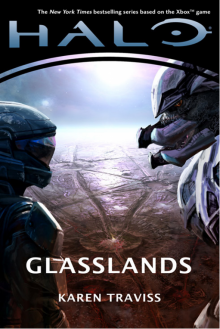 Halo: Glasslands
Halo: Glasslands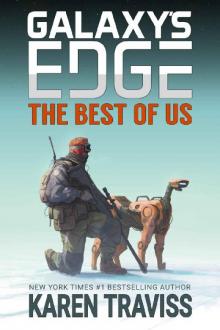 The Best of Us
The Best of Us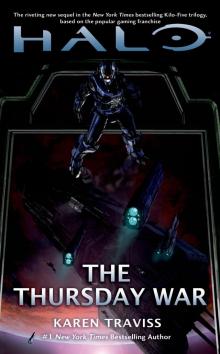 Halo: The Thursday War
Halo: The Thursday War Ally
Ally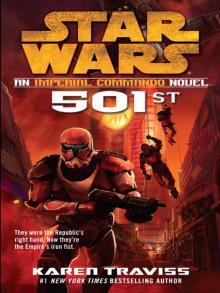 501st: An Imperial Commando Novel
501st: An Imperial Commando Novel True Colors
True Colors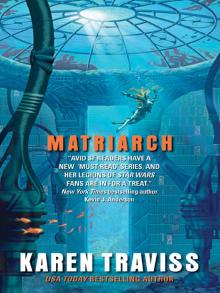 Matriarch
Matriarch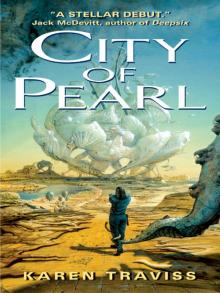 City of Pearl
City of Pearl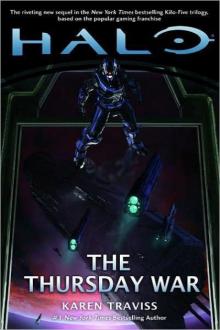 The Thursday War
The Thursday War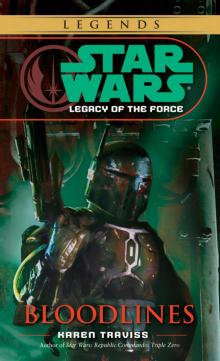 Bloodlines
Bloodlines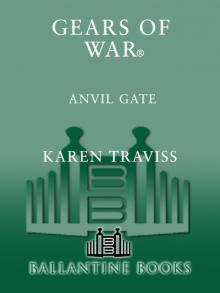 Gears of War: Anvil Gate
Gears of War: Anvil Gate Crossing the Line
Crossing the Line Star Wars - The Clone Wars 01
Star Wars - The Clone Wars 01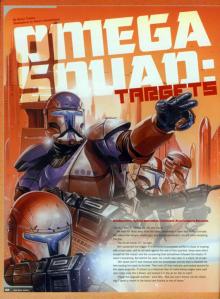 Omega Squad: Targets
Omega Squad: Targets Halo®: Mortal Dictata
Halo®: Mortal Dictata Hard Contact
Hard Contact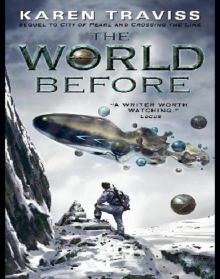 The World Before
The World Before Order 66
Order 66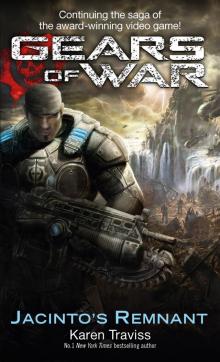 Gears of War: Jacinto's Remnant
Gears of War: Jacinto's Remnant Sacrifice
Sacrifice Triple Zero
Triple Zero Gears of War: The Slab (Gears of War 5)
Gears of War: The Slab (Gears of War 5) NEW JEDI ORDER: BOBA FETT: A PRACTICAL MAN
NEW JEDI ORDER: BOBA FETT: A PRACTICAL MAN Going Grey
Going Grey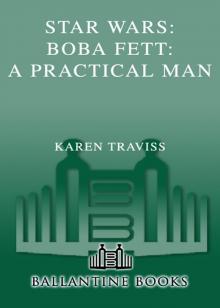 Star Wars: Boba Fett: A Practical Man
Star Wars: Boba Fett: A Practical Man Revelation
Revelation Coalition's End
Coalition's End No Prisoners
No Prisoners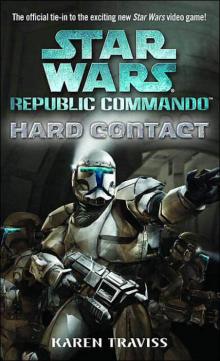 Star Wars Republic Commando: Hard Contact
Star Wars Republic Commando: Hard Contact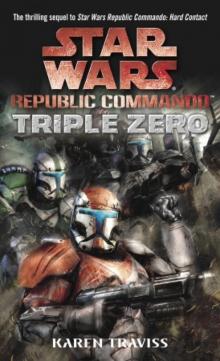 Star Wars: Republic Commando: Triple Zero rc-3
Star Wars: Republic Commando: Triple Zero rc-3 The Clone Wars
The Clone Wars The Clone Wars: No Prisoners
The Clone Wars: No Prisoners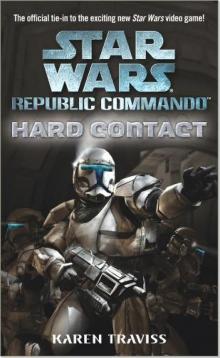 Star Wars: Republic Commando: Hard Contact rc-1
Star Wars: Republic Commando: Hard Contact rc-1 Judge
Judge Omega Squad: Targets rc-4
Omega Squad: Targets rc-4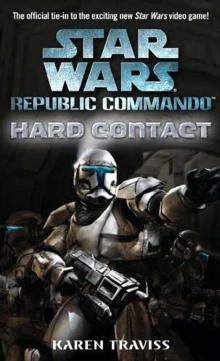 Star Wars - Republic Commando - Hard Contact
Star Wars - Republic Commando - Hard Contact